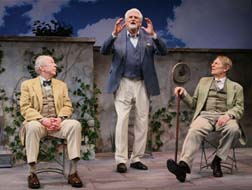
Lucy Komisar
“Heroes” – three French WWI veterans imagine their lives
“Heroes.”
Written by Gerald Sibleyras, translated by Tom Stoppard.
Directed by Carl Forsman.
Keen Company at the Clurman Theatre, 410 West 42 Street.
212-279-4200.
Opened March 8, 2009, closes April 12, 2009.
Reviewed by Lucy Komisar March 13, 2009.
http://www.keencompany.org/
 |
| Jonathan Hogan, Ron Holgate, and John Cullum in "Heroes". Photo by Theresa Squire. |
Three men at a French home for World War I veterans are a wistful, sad lot living in a boring present and (some of them) fearing or hoping for a fanciful future. A little imagination goes a long way. Gérald Sibieyras’ play, translated from the French by Tom Stoppard, has a slight plot but meaty characterizations by the excellent cast of this Keen Company production. Director Carl Foreman succeeds in warding off excessive sentimentality.
It’s 1959. Henri (John Cullum), who has a bad leg but gets around pretty well with cane, has been at the place for 25 years. It’s not clear why, since he seems quite mentally sound and not too hampered by his disability. He manages a constitutional outside the grounds every day, taking him as far as his big excitement, a view of the town's girls' school.
Philippe (Jonathan Hogan) suffers from fainting spells, the result of shrapnel lodged in his head. He occasionally appears to lose consciousness and then wakes up declaiming, "From the back, Captain." and Gustave (Ron Holgate), who thinks of himself as an aristocrat, is definitely, as one of his confrères puts it, “tolerably deranged.”
Their interactions occur in a small space defined by a white concrete wall splashed with green ivy. The home for them sometimes seems as much a prison as a refuge. Or it becomes the symbol of what have become imprisoning, boring, uneventful lives.
They endow their mundane communications with wartime language. For example, they talk about staving off other inhabitants of the home who frequent a larger terrace that is about to be repaired and might "invade" the small one used by the three.
 |
| Jonathan Hogan, Ron Holgate, and John Cullum in "Heroes". Photo by Theresa Squire. |
Gustave is afraid to go out of the compound gate, but works to persuade other to undertake an expedition to scale a distant hill topped by poplar trees. And he insists on their taking along a 20-pound stone dog that sits on their terrace.
Philippe is distraught because he believes that the Sister Madeleine allows only one birthday per inhabitant, and since someone with his birthday has arrived, he fears that he, Philippe, is marked for murder.
Their commentaries on women are occasionally vulgar if not stupid, though
this is, after all, the 1950s, and they are men without women. (One of
them does acknowledge that "most men are humorless creeps.")
Cullum’s mood and wistful expression as Henri are wonderfully subtle and sensitive. He is the emotional center of the play, fine tuned to the others' needs. He attempts to humor them, even collecting blankets for Gustav’s impossible expedition. Henri, whose disability is only physical, understands how little there is for any of them to look forward to.
The audience, however, can look forward to an appealing, occasionally tender, look at three men winding down their lives with recourse to memory, sensitivity and imagination.
| museums | NYTW mail | recordings | coupons | publications | classified |
